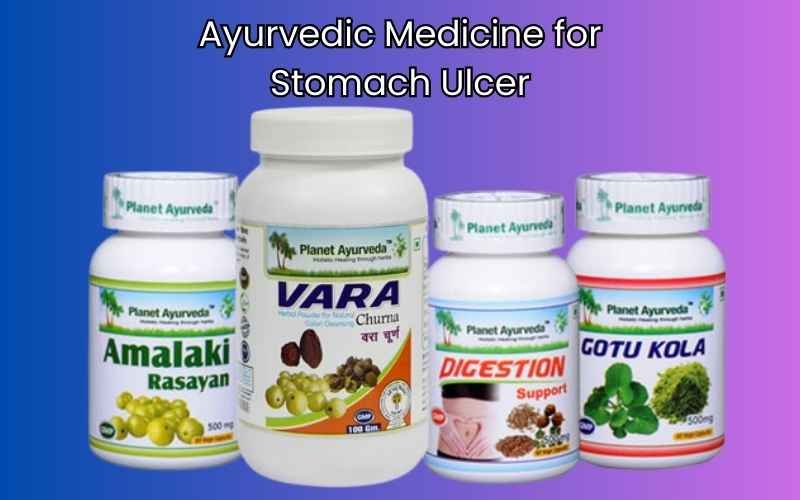Stomach ulcers, also known as peptic ulcers, are painful sores that develop in the lining of the stomach, esophagus, or small intestine. They occur when the protective mucus layer of the stomach is reduced, allowing digestive acids to damage the stomach lining. Common symptoms include burning stomach pain, bloating, heartburn, and nausea. While conventional medicine offers various treatments, Ayurveda, an ancient Indian system of medicine, provides natural and holistic remedies for stomach ulcers.

Understanding Stomach Ulcers in Ayurveda
In Ayurveda, stomach ulcers are primarily linked to an imbalance in the Pitta dosha, one of the three fundamental energies or doshas that govern physiological and psychological functions in the body. The Pitta dosha is associated with heat, metabolism, and transformation, making it integral to digestive processes. When Pitta becomes aggravated, it can disrupt the balance and harmony of these processes, leading to various gastrointestinal issues, including stomach ulcers.
Causes of Pitta Aggravation
- Dietary Factors:
- Consumption of spicy, sour, and excessively hot foods.
- Overeating or irregular eating habits.
- Excessive intake of alcohol, caffeine, and processed foods.
- Eating too much red meat and fried foods.
- Lifestyle Factors:
- High levels of stress and emotional turmoil.
- Lack of sleep or irregular sleep patterns.
- Excessive exposure to heat and sun.
- Smoking and use of tobacco products.
- Environmental Factors:
- Hot and humid climates can aggravate Pitta.
- Occupational exposure to chemicals and pollutants.
Symptoms of Pitta Imbalance Leading to Stomach Ulcers
- Burning sensation in the stomach.
- Acid reflux and heartburn.
- Nausea and vomiting.
- Sour belching and indigestion.
- Loss of appetite or excessive hunger.
- Severe abdominal pain, especially when the stomach is empty.
Ayurvedic Diagnosis and Treatment
Ayurvedic diagnosis involves a thorough examination of an individual’s dosha constitution (Prakriti) and current dosha imbalances (Vikriti). Practitioners also consider factors like dietary habits, lifestyle, stress levels, and medical history.
Treatment Goals:
- Balancing the Pitta Dosha:
- Using cooling and soothing herbs and foods.
- Avoiding Pitta-aggravating activities and foods.
- Healing the Stomach Lining:
- Strengthening and soothing the gastric mucosa.
- Reducing inflammation and irritation.
- Promoting Natural Healing:
- Supporting the body’s natural repair mechanisms.
Ayurvedic Remedies for Stomach Ulcers
- Dietary Recommendations:
- Eat Pitta-pacifying foods: sweet, bitter, and astringent tastes.
- Include cooling foods like cucumbers, melons, and leafy greens.
- Drink plenty of water and herbal teas.
- Avoid spicy, sour, and oily foods.
- Herbal Treatments:
- Amla (Indian Gooseberry): Rich in Vitamin C, helps reduce acidity.
- Licorice Root: Soothes and heals the stomach lining.
- Aloe Vera Juice: Has anti-inflammatory properties and promotes healing.
- Shatavari (Asparagus Racemosus): Balances Pitta and supports mucosal health.
- Lifestyle Modifications:
- Practice stress-reducing techniques such as yoga, meditation, and Pranayama (breathing exercises).
- Establish regular sleep patterns and ensure adequate rest.
- Avoid excessive heat and stay in cool environments when possible.
- Engage in calming and non-competitive physical activities.
- Panchakarma Therapy (Detoxification Procedures):
- Virechana (Therapeutic Purgation): Helps eliminate excess Pitta from the body.
- Snehapana (Intake of Medicated Ghee): Prepares the body for detoxification and soothes the digestive tract.
- Shirodhara (Oil Dripping Therapy): Reduces stress and promotes mental clarity.
Preventive Measures in Ayurveda
- Follow a Pitta-pacifying diet consistently.
- Maintain a balanced routine with regular meals and proper sleep.
- Manage stress through mindfulness and relaxation practices.
- Avoid triggers such as spicy foods, alcohol, and smoking.
- Stay hydrated and consume herbal teas known for their cooling properties.
By understanding the holistic approach of Ayurveda to treating stomach ulcers, individuals can adopt a lifestyle and diet that promote balance, prevent recurrence, and support overall digestive health.
Ayurvedic Remedies for Stomach Ulcers
Aloe Vera Juice
Benefits:
- Aloe Vera is renowned for its anti-inflammatory and soothing properties.
- It helps in reducing stomach acidity, promoting healing of the stomach lining.
- It also aids in digestion and helps in reducing bloating and other digestive issues.
Usage:
- Drink a quarter cup of fresh Aloe Vera juice on an empty stomach in the morning.
- Ensure the Aloe Vera juice is fresh and free from additives.
Licorice Root (Mulethi)
Benefits:
- Licorice root has been traditionally used in Ayurveda for its powerful healing and anti-ulcer properties.
- It forms a protective coating over the stomach lining, shielding it from stomach acid.
- Licorice root also helps in reducing acid production in the stomach.
Usage:
- Boil a teaspoon of licorice root powder in a cup of water.
- Strain and drink this tea twice a day.
- Alternatively, you can chew on a small piece of licorice root.
Amalaki (Indian Gooseberry)
Benefits:
- Amalaki is rich in Vitamin C, which promotes healing and soothes the stomach lining.
- It acts as a powerful antioxidant, reducing inflammation and oxidative stress in the stomach.
- It also enhances digestion and metabolism, contributing to overall gastrointestinal health.
Usage:
- Consume fresh Amalaki juice daily.
- Alternatively, take Amalaki powder mixed with honey once a day.
Turmeric (Curcumin)
Benefits:
- Turmeric is known for its potent anti-inflammatory and healing properties due to its active ingredient, curcumin.
- It helps in reducing inflammation and promoting the healing of the stomach lining.
- Turmeric also enhances bile production, which aids in digestion.
Usage:
- Mix a teaspoon of turmeric powder in a glass of warm water or milk.
- Drink this mixture once a day.
- You can also add a pinch of black pepper to enhance the absorption of curcumin.
Cabbage Juice
Benefits:
- Cabbage juice contains natural anti-ulcer compounds, particularly glutamine, which helps in healing the stomach lining.
- It promotes the production of mucous in the stomach, protecting the lining from acid.
- Cabbage juice also supports overall digestive health.
Usage:
- Blend fresh cabbage with water and strain the juice.
- Drink half a cup of this juice twice daily.
- Ensure the cabbage is fresh and organic for best results.
Slippery Elm
Benefits:
- Slippery Elm forms a gel-like substance when mixed with water, which coats and soothes the stomach lining.
- It helps in reducing inflammation and irritation in the stomach.
- Slippery Elm also promotes healing by providing a protective barrier against stomach acid.
Usage:
- Mix a teaspoon of slippery elm powder in a cup of warm water.
- Drink this mixture after meals.
- You can also consume it as a tea or mix it into smoothies.
Additional Tips for Managing Stomach Ulcers with Ayurveda
- Avoid Pitta-Aggravating Foods:
- Stay away from spicy, sour, and fried foods.
- Limit the intake of citrus fruits, tomatoes, and vinegar.
- Hydration:
- Drink plenty of water throughout the day.
- Herbal teas such as chamomile, mint, and fennel can be beneficial.
- Stress Management:
- Practice yoga, meditation, and deep breathing exercises to reduce stress.
- Regular exercise can also help in managing stress and improving overall health.
- Regular Meals:
- Eat meals at regular intervals to avoid long gaps between meals.
- Include small, frequent meals to prevent the stomach from being empty for long periods.
- Sleep:
- Ensure adequate and regular sleep to help the body heal and maintain balance.
- Consult an Ayurvedic Practitioner:
- For personalized treatment plans and advice, it’s best to consult an experienced Ayurvedic practitioner who can provide guidance based on your individual constitution and needs.
By incorporating these Ayurvedic remedies and lifestyle changes, individuals can effectively manage and heal stomach ulcers, promoting overall digestive health and well-being.
Dietary and Lifestyle Recommendations for Managing Stomach Ulcers
Follow a Pitta-Pacifying Diet
Foods to Avoid:
- Spicy Foods: Hot peppers, chili powder, and other spicy ingredients.
- Acidic Foods: Citrus fruits, tomatoes, and vinegar.
- Fried and Oily Foods: Deep-fried snacks, heavy oils, and fatty meats.
- Processed Foods: Packaged snacks, junk food, and foods high in preservatives.
Recommended Foods:
- Cooling Foods: Coconut water, melons, cucumbers, and leafy greens.
- Soothing Foods: Dairy products such as milk, ghee, and yogurt (if tolerated).
- Bland Foods: Rice, oats, and barley.
- Sweet Fruits: Apples, pears, and bananas (ripe).
Eat Small, Frequent Meals
Benefits:
- Helps in preventing excessive production of stomach acid.
- Keeps the stomach partially filled, reducing irritation from stomach acid.
- Stabilizes blood sugar levels, providing consistent energy throughout the day.
Tips:
- Plan for 5-6 small meals instead of 3 large ones.
- Include a mix of carbohydrates, proteins, and healthy fats in each meal.
- Avoid skipping meals to prevent excess acidity.
Stay Hydrated
Benefits:
- Dilutes stomach acids, reducing irritation and burning sensations.
- Aids in overall digestion and nutrient absorption.
Tips:
- Drink 8-10 glasses of water daily.
- Include herbal teas such as chamomile, mint, or fennel.
- Avoid caffeinated and carbonated beverages which can aggravate symptoms.
Avoid Stress
Benefits:
- Reduces the risk of stress-induced acid production.
- Helps maintain overall mental and physical health.
Techniques:
- Yoga: Practice gentle poses like Savasana (Corpse Pose) and Balasana (Child’s Pose) to relax.
- Meditation: Spend 10-15 minutes daily practicing mindfulness or guided meditation.
- Deep Breathing: Use techniques such as diaphragmatic breathing or alternate nostril breathing to calm the mind.
Regular Exercise
Benefits:
- Enhances digestive function and reduces symptoms of bloating and indigestion.
- Helps in maintaining a healthy weight, reducing pressure on the stomach.
Recommended Activities:
- Walking: A 30-minute walk daily can improve digestion and reduce stress.
- Yoga: Focus on poses that promote relaxation and gentle stretching.
- Cycling and Swimming: Low-impact exercises that boost overall fitness without straining the stomach.
Additional Lifestyle Tips
- Proper Sleep:
- Aim for 7-8 hours of quality sleep each night.
- Establish a regular sleep routine to support the body’s natural healing processes.
- Avoid Smoking and Alcohol:
- Both can increase stomach acid and worsen ulcer symptoms.
- Seek help to quit smoking and limit or avoid alcohol consumption.
- Chew Food Thoroughly:
- Chewing food well aids in better digestion and reduces the workload on the stomach.
- Eat slowly to allow for better digestion and to recognize fullness signals.
- Elevate the Head While Sleeping:
- Use extra pillows to keep the head elevated and reduce acid reflux during sleep.
- Wear Loose Clothing:
- Avoid tight clothing around the abdomen to prevent unnecessary pressure on the stomach.
By adhering to these dietary and lifestyle recommendations, individuals can effectively manage stomach ulcers, promote healing, and maintain overall digestive health.
Conclusion
Ayurvedic medicine offers a natural and holistic approach to treating stomach ulcers by addressing the root cause of the problem and promoting overall well-being. Incorporating these remedies and lifestyle changes can help balance the Pitta dosha, soothe the stomach lining, and facilitate healing. However, it is essential to consult with a qualified Ayurvedic practitioner before starting any new treatment, especially if you have underlying health conditions or are taking other medications.
By embracing Ayurveda, you can find a path to not only healing your stomach ulcer but also achieving a balanced and healthy life.
Top 20 FAQs about Ayurvedic Medicine for Stomach Ulcers
- What is a stomach ulcer?
- A stomach ulcer, or peptic ulcer, is a sore that develops on the lining of the stomach, esophagus, or small intestine due to the erosion caused by stomach acids.
- What causes stomach ulcers?
- Common causes include an infection with Helicobacter pylori bacteria, prolonged use of NSAIDs (nonsteroidal anti-inflammatory drugs), excessive alcohol consumption, smoking, and high levels of stress.
- How does Ayurveda view stomach ulcers?
- Ayurveda associates stomach ulcers with an imbalance of the Pitta dosha, which leads to excessive heat and acid production in the stomach.
- What are the symptoms of a stomach ulcer?
- Symptoms include burning stomach pain, bloating, heartburn, nausea, vomiting, and in severe cases, black or bloody stools.
- How can Ayurveda help with stomach ulcers?
- Ayurveda offers natural remedies and lifestyle modifications to balance the Pitta dosha, reduce acidity, soothe the stomach lining, and promote healing.
- What are some effective Ayurvedic remedies for stomach ulcers?
- Remedies include Aloe Vera juice, licorice root, Amalaki (Indian gooseberry), turmeric, cabbage juice, and slippery elm.
- How does Aloe Vera help with stomach ulcers?
- Aloe Vera has anti-inflammatory and soothing properties that help heal the stomach lining and reduce acidity.
- Can licorice root help heal stomach ulcers?
- Yes, licorice root forms a protective coating over the stomach lining and helps reduce acid production, promoting healing.
- What is the role of Amalaki in treating stomach ulcers?
- Amalaki is rich in Vitamin C and antioxidants, which help heal and soothe the stomach lining.
- How does turmeric benefit those with stomach ulcers?
- Turmeric has anti-inflammatory and healing properties due to curcumin, which helps reduce inflammation and promote healing of the stomach lining.
- Is cabbage juice effective for stomach ulcers?
- Yes, cabbage juice contains natural anti-ulcer compounds that can help heal the stomach lining.
- What lifestyle changes are recommended in Ayurveda for stomach ulcers?
- Recommendations include following a Pitta-pacifying diet, eating small and frequent meals, staying hydrated, avoiding stress, and engaging in regular exercise.
- What foods should be avoided if you have a stomach ulcer?
- Avoid spicy, acidic, and fried foods, as well as alcohol and caffeine, which can increase stomach acid production.
- What foods can help soothe a stomach ulcer?
- Cooling and soothing foods like coconut water, melons, cucumbers, and dairy products can help.
- How important is stress management in treating stomach ulcers?
- Very important. Stress can aggravate Pitta dosha and increase acid production, so managing stress through yoga, meditation, and deep breathing is beneficial.
- Can Ayurvedic treatments be used alongside conventional medicine?
- Yes, Ayurvedic treatments can complement conventional medicine, but it is important to consult with a healthcare provider before combining treatments.
- Are there any side effects of Ayurvedic treatments for stomach ulcers?
- Ayurvedic treatments are generally safe when used correctly, but it is important to follow the guidance of a qualified Ayurvedic practitioner to avoid potential side effects.
- How long does it take to see results with Ayurvedic treatments for stomach ulcers?
- The time frame can vary depending on the severity of the ulcer and the individual’s overall health. Consistency and adherence to the treatment plan are crucial.
- Can children and pregnant women use Ayurvedic remedies for stomach ulcers?
- It is essential to consult with a qualified Ayurvedic practitioner before administering any remedies to children or pregnant women to ensure safety and appropriateness.
- Where can I find a qualified Ayurvedic practitioner?
- You can find a qualified practitioner through reputable Ayurvedic clinics, health centers, or professional organizations that certify Ayurvedic practitioners.


